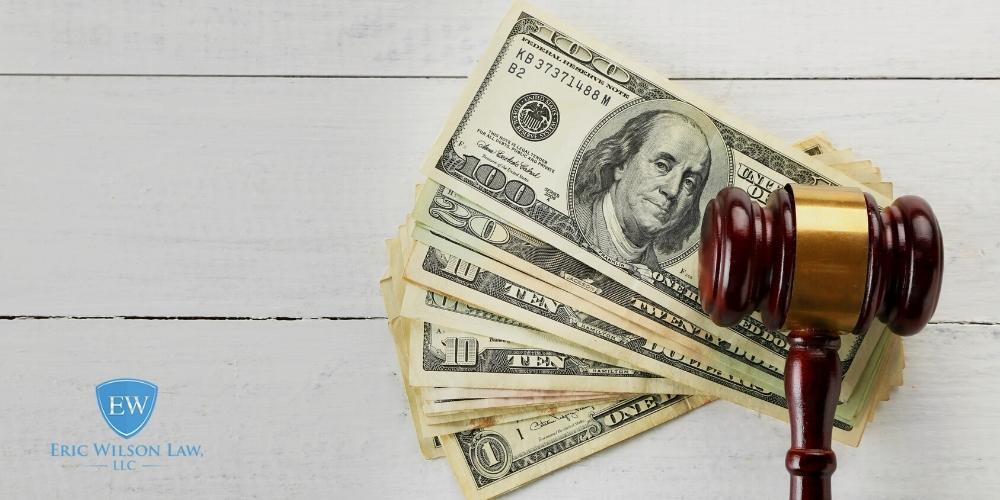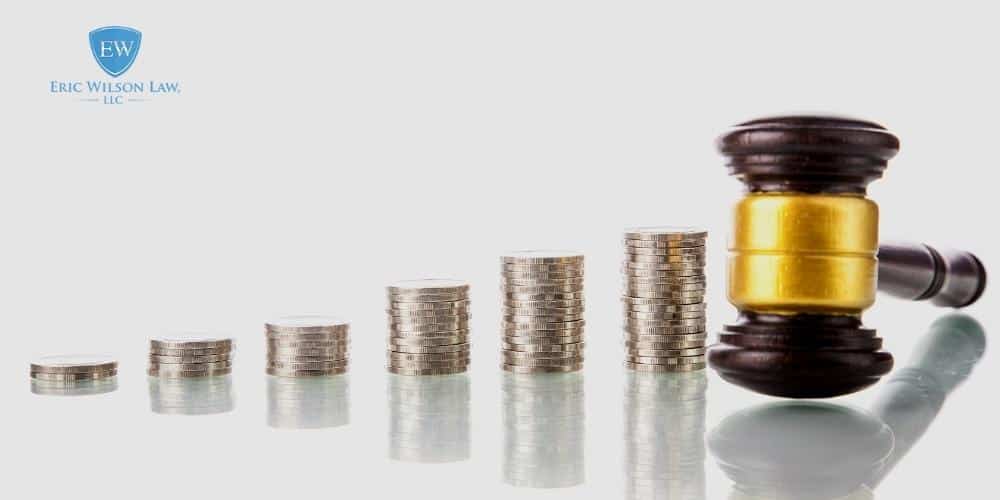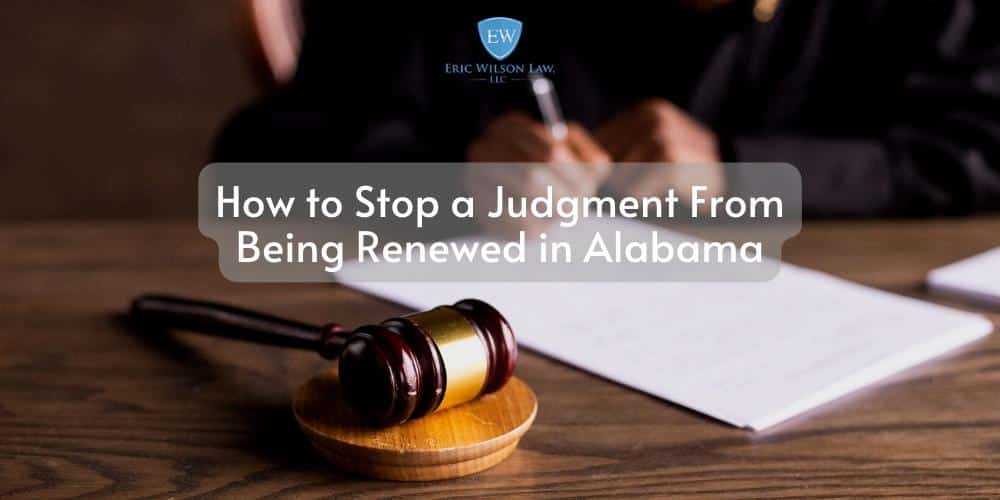Did you know that if you continuously fail to pay your debts, your creditors can sue you, get a judgment against you, and then begin debt collection efforts? In some states, a money judgment can last up to 20 years. In that time frame, creditors can renew the judgment several times until you pay off your debt. If this sounds similar to your current situation, maybe you’re wondering how to stop a judgment from being renewed. The legal team at Eric Wilson Law LLC answers these questions and more below.
Eric Wilson Law LLC is a debt relief agency in Tuscaloosa, AL. To schedule a free consultation, call 205-349-1280 today.
What is a Judgment?
A judgment, in this case, is a document issued by a judge after you are found to be liable for a debt, that states that a creditor deserves some amount of money from you. Once a court clerk enters a judgment against you, a judgment creditor can employ many means to receive money from you – the judgment debtor. The most common way that judgment creditors will take money from judgment debtors is through wage garnishment.
A judgment creditor can sue you for almost any kind of debt: credit card debt, past due child support, medical debt, and student loan debt, just to name a few kinds.
Reasons Why Creditors Can Get a Judgment Against You
The most common reason why a judgment creditor will sue you is if you owe money. The only way for most creditors to legally collect money from you is if they file a civil judgment against you. A creditor can also get a judgment against you if:
- You fail to respond to their complaints,
- You fail to respond to a discovery request,
- Or you lose a trial or a summary judgment motion.
You’ll receive a copy of the civil judgement against you a few days after the court clerk files it. Then, your judgment creditor can begin the debt collection process.
Components of a Money Judgment
If you’re a first time judgment debtor, it’s important to know that a money judgment is not made up of just the debt you owe the creditor. There are other components as well, including:
- Interest: As a general rule of thumb, you should always review your loan contract, especially if a creditor files a judgment against you. Your loan contract will lay out exactly how much you have to pay in annual interest in the case of a default judgment. In other words, not only do you have to pay back your debt, you also have to pay back the interest on that debt. Interest can add up from the day a judgment creditor files the court documents until the day you fully pay off the debt. With annual interest rates between 8% to 12% (depending on your specific loan contract and state law), this can certainly add up.
- Court Costs: Debt collection lawsuits aren’t free. A judgement creditor will have to spend some money on things like filing the judgment, the court hearing, the discovery request, and more. So these costs will likely be lumped together with the debt you owe.
- Attorney Fees: Lastly, you may have to pay attorney fees along with your debt, but again, this will depend on your specific loan contract and state law. Some loan contracts specifically state that if your creditor ever sues you and wins the lawsuit, then you must pay the attorney fees associated with the civil case.
What is Judgment Proof?
Some judgment debtors are “judgment proof” or “collection proof.” Basically this means that a judgment creditor can’t collect money or other assets from someone through a judgment. This may be because the debtor has little to no income, no real property, and no savings.
Additionally, debtors who are judgment proof generally only have unsecured debts and what little property they do have is protected by exemptions. In situations like this, a judgment creditor likely can’t take money from the debtor’s bank account or income, even if they get a judgment, because there’s just no money to take.

Common Debt Collection Actions That Judgment Creditors Can Take
The most common types of collection activities that a judgment creditor can take after winning a lawsuit against you is wage garnishment, bank account garnishment, or a property levy.
Wage garnishments occur when creditors take money directly out of your paycheck. They can do this through an earnings withholding order, which is a court order that tells a debtor’s boss to withhold a certain amount of money from their paycheck. Federal law states that creditors can take 25% of a debtor’s disposable income from their paychecks.
Meanwhile, bank account garnishment occurs when creditors take money directly out of your bank account in order to pay off a debt. As previously stated, there’s a limit on how much money that creditors can take from a debtor’s wages, but there’s no limit on how much they can take from a debtor’s bank accounts.
Lastly, a property levy is when a creditor takes certain property from a judgement debtor in order to sell it and then pay off debt.
Some people receive money from sources other than just their job. You may be wondering, can a judgment creditor take money from all my sources of income? The answer is no. A judgment creditor cannot take money from the sources of income listed below:
- Child support or alimony
- Social security benefits
- Unemployment benefits
- Civil service and federal employee retirement benefits
- Public assistance benefits
- Veteran’s benefits
How Long Do Money Judgments Last?
The answer to this question depends on the state you live in. In most states, money judgments last between 5 to 20 years. In Alabama, money judgements last up to 20 years (Ala. Code § 6-9-190). But judgments are generally only enforceable for 10 years (Ala. Code § 6-9-191), and then they’re renewed for another 10 years if the judgment debtor still hasn’t paid the debt.
How to Stop a Judgment From Being Renewed
A judgement debtor generally has very few options to stop a judgment from being renewed: paying the judgment, negotiating with the judgement creditor, claiming property as exempt, or filing for bankruptcy.
Pay the Judgment
The first option for preventing judgment renewal in Alabama – and the option that most people don’t want to hear – is just paying the judgment. You don’t have to pay it all at once. Most people can’t pay off judgments all at once, especially if they’re several thousand dollars.
So the best thing you can do is create a payment plan and stick to it. In 3 to 5 years, you could completely pay off your debt and get rid of the judgment. Then, you could receive a release of judgment and be free. If you need help creating a realistic payment plan, contact Tuscaloosa bankruptcy attorney Eric Wilson. He has been helping his clients regain control of their finances for more than 25 years.
Negotiate With Your Creditor
Another option is negotiating with a judgment creditor. Believe it or not, getting people to pay their bills is hard work. If some kind of agreement could relieve the judgment creditor of the trouble of suing you, garnishing your wages, taking your property, or all of the above, then they may agree to it. Additionally, judgment creditors always have to worry that you may lose your job or file for bankruptcy, which again, puts them through a lot of trouble. In situations like these, the creditor often doesn’t receive any debt repayment.
Negotiating with a creditor without professional guidance could get you nowhere. If you’re looking to make an offer with your judgment creditor, call Eric Wilson first. He will listen intently to your situation and help you come up with the best possible solution.
Claim Your Personal Property as Exempt
If your creditor is trying to enforce a property levy or lien in order to pay off your debt, you could claim certain property as exempt property. This means that creditors can’t use your property to pay off your debt regardless of how much you owe. In order to protect exempt property though, you must file a claim of exemption.
It’s important to remember that many states have their own set of exemptions. For example, Alabama has a homestead exemption, a personal property exemption, and a wildcard exemption.
Not only can Tuscaloosa bankruptcy attorney Eric Wilson protect your finances, he can protect your property too. For more information on how to file a claim of exemption, schedule an appointment with our Tuscaloosa bankruptcy law firm.
File for Bankruptcy
Last but not least, you can file bankruptcy. One of the many benefits of bankruptcy is the automatic stay that immediately goes into effect upon filing. An automatic stay can:
- Stop creditor harassment,
- Stop wage garnishments and bank garnishments,
- Prevent foreclosures and repossessions,
- And most importantly: stop judgment renewal.
Filing for Chapter 7 bankruptcy or Chapter 13 bankruptcy often sounds like rock bottom. In reality, bankruptcy can get rid of most of your debt within a few months. Then, you’re free from crippling debt and pesky creditors.

Call a Tuscaloosa Bankruptcy Lawyer at Eric Wilson Law Today
Eric Wilson Law LLC is a debt relief agency that serves the people of Tuscaloosa, AL and beyond. Our law firm has helped thousands of clients achieve a life of freedom from debt, creditor harassment, judgments, foreclosures, repossessions, you name it. We’re ready to start an attorney-client relationship with you. Call us today at 205-349-1280 to schedule a free consultation.


